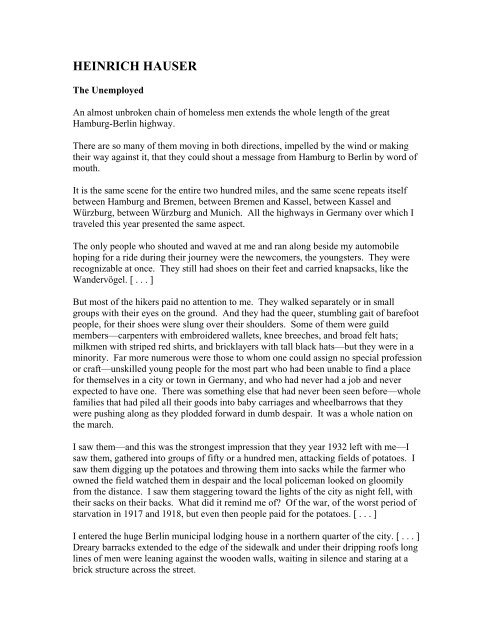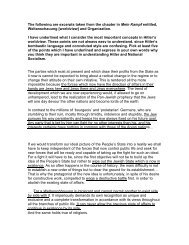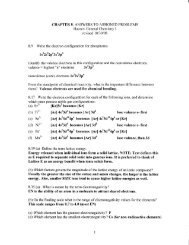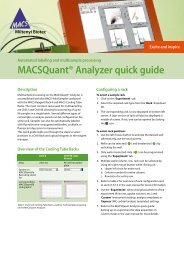FRIEDRICH KRONER - STLCC.edu :: Users
FRIEDRICH KRONER - STLCC.edu :: Users
FRIEDRICH KRONER - STLCC.edu :: Users
Create successful ePaper yourself
Turn your PDF publications into a flip-book with our unique Google optimized e-Paper software.
HEINRICH HAUSER<br />
The Unemployed<br />
An almost unbroken chain of homeless men extends the whole length of the great<br />
Hamburg-Berlin highway.<br />
There are so many of them moving in both directions, impelled by the wind or making<br />
their way against it, that they could shout a message from Hamburg to Berlin by word of<br />
mouth.<br />
It is the same scene for the entire two hundred miles, and the same scene repeats itself<br />
between Hamburg and Bremen, between Bremen and Kassel, between Kassel and<br />
Würzburg, between Würzburg and Munich. All the highways in Germany over which I<br />
traveled this year presented the same aspect.<br />
The only people who shouted and waved at me and ran along beside my automobile<br />
hoping for a ride during their journey were the newcomers, the youngsters. They were<br />
recognizable at once. They still had shoes on their feet and carried knapsacks, like the<br />
Wandervögel. [ . . . ]<br />
But most of the hikers paid no attention to me. They walked separately or in small<br />
groups with their eyes on the ground. And they had the queer, stumbling gait of barefoot<br />
people, for their shoes were slung over their shoulders. Some of them were guild<br />
members—carpenters with embroidered wallets, knee breeches, and broad felt hats;<br />
milkmen with striped red shirts, and bricklayers with tall black hats—but they were in a<br />
minority. Far more numerous were those to whom one could assign no special profession<br />
or craft—unskilled young people for the most part who had been unable to find a place<br />
for themselves in a city or town in Germany, and who had never had a job and never<br />
expected to have one. There was something else that had never been seen before—whole<br />
families that had piled all their goods into baby carriages and wheelbarrows that they<br />
were pushing along as they plodded forward in dumb despair. It was a whole nation on<br />
the march.<br />
I saw them—and this was the strongest impression that they year 1932 left with me—I<br />
saw them, gathered into groups of fifty or a hundred men, attacking fields of potatoes. I<br />
saw them digging up the potatoes and throwing them into sacks while the farmer who<br />
owned the field watched them in despair and the local policeman looked on gloomily<br />
from the distance. I saw them staggering toward the lights of the city as night fell, with<br />
their sacks on their backs. What did it remind me of? Of the war, of the worst period of<br />
starvation in 1917 and 1918, but even then people paid for the potatoes. [ . . . ]<br />
I entered the huge Berlin municipal lodging house in a northern quarter of the city. [ . . . ]<br />
Dreary barracks extended to the edge of the sidewalk and under their dripping roofs long<br />
lines of men were leaning against the wooden walls, waiting in silence and staring at a<br />
brick structure across the street.









